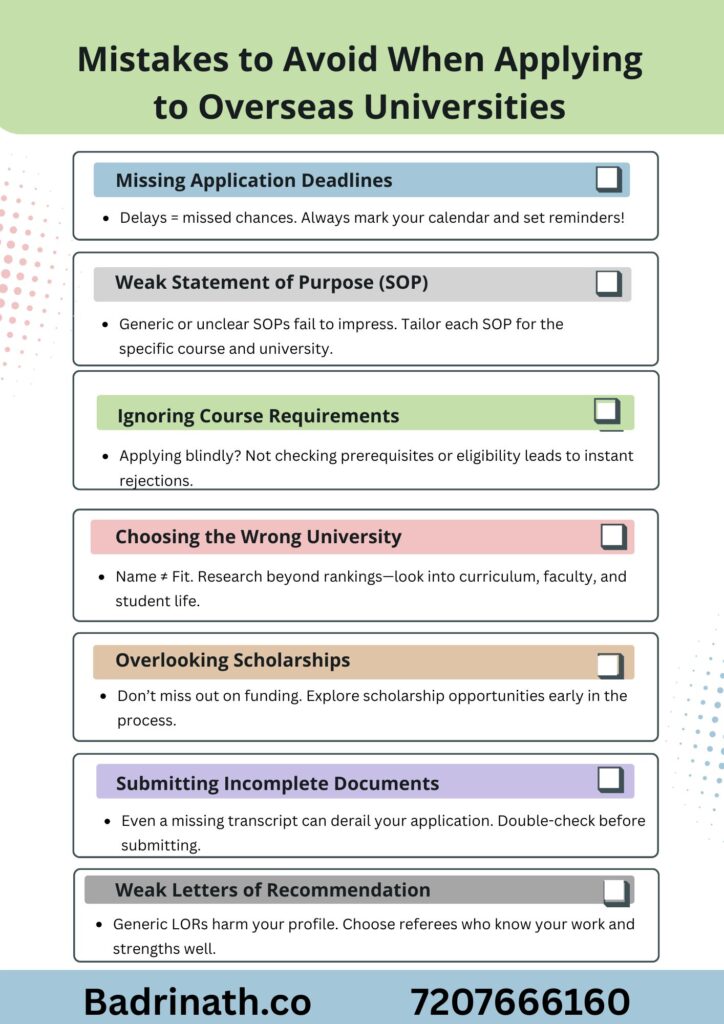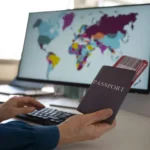Let’s get real. Studying abroad can transform your life. It opens up global career paths, diverse friendships, and deep personal growth. But here’s the truth: the path to international education is full of pitfalls. One wrong move and your dream university could slip right through your fingers. Take Gaurav, who planned early, triple-checked his documents, and now thrives at the University of British Columbia. Contrast him with Tanya, who missed her visa appointment deadline, submitted a half-baked SOP, and had to defer her dreams by a full year. You don’t want to be Tanya. So, let’s break down the common study abroad mistakes and make sure you’re on the right path.

1. Poor Research on Universities and Programs
Many students just pick universities based on rankings or where their friends are applying. Big mistake.
Assuming all degrees are the same: A Master’s in Computer Science in one country might focus on research, while in another it could be more practical. Always review the syllabus.
Not matching your goals to the curriculum: Look at course modules, internship opportunities, alumni stories, and career outcomes. If your passion is AI, don’t pick a generic IT program.
2. Ignoring Admission Deadlines
Application timeline planning: Deadlines differ by country, course, and even admission cycle. Some open a year in advance!
Late submission = no chance
Even if you’re the perfect candidate, missing the deadline is a deal-breaker. Use spreadsheets or apps like Trello to keep track.
3. Incomplete or Inaccurate Application Forms
This happens more often than you’d think.
Common application errors students make
- Leaving fields blank
- Wrong email address
- Mismatched names on documents
Review checklist to avoid rejections Ask a mentor or advisor to double-check everything. Cross-check document formats, sizes, and file names too.
4. Weak Statement of Purpose (SOP)
The SOP is your voice in the application.
Generic vs. personalized SOP: Admissions teams see thousands. If yours starts with “Since childhood I wanted to…”—you’re already in the danger zone.
What top admissions officers really look for: They want your story. Your why. Your goals. Show passion, clarity, and relevance.
5. Poor Academic Records Without Explanation
Even top universities accept students with imperfect records—if they explain it well.
How to explain academic gaps or poor grades
Use the optional essay or an attached statement to describe health issues, personal crises, or learning curves.
Use of supplementary documents Include certificates, achievements, or community work to show your potential.
6. Skipping Proofreading of Documents
This is a silent killer of great applications.
Typos and grammar = lack of seriousness
“I’m passioned about education.” That one typo can cost you credibility.
Get someone to review it before submitting Use Grammarly, get a friend to check it, or hire an editor if needed.
7. Weak or Fake Letters of Recommendation
Selecting the wrong recommender
Don’t ask your uncle or random teacher. Choose professors or employers who know you and can speak about your achievements.
Red flags universities spot instantly
Vague praise, repetitive content, and lack of specific examples = generic or fake.
8. Underestimating the Student Visa Process
You’ve got the offer? Great. But now comes the visa.
Key application errors student visa applicants make
- Submitting expired documents
- Mismatch between funding and tuition
- Not practicing for the visa interview
Documentation, interviews, and preparation Prepare a file with every required paper. Rehearse expected interview questions. Be honest, confident, and clear.
9. Not Preparing Financially
Ignoring hidden costs
There’s more than just tuition. Think health insurance, textbooks, transportation, housing deposits, etc.
Not showing sufficient proof of funds
Your visa can get rejected if you don’t meet financial requirements. Use savings, sponsorships, or loans and document them well.
10. Ignoring Cultural Fit and Life Abroad
University is more than academics.
What it’s like to live in a new culture
Imagine celebrating Diwali alone or struggling to eat local food. Culture shock is real.
Mental readiness and support systems
Join student communities, follow university pages, or reach out to alumni. Preparation reduces anxiety.

Conclusion
Studying abroad is one of the most rewarding experiences you can have—but only if you get there! Every mistake listed above has stopped a student like you in their tracks. But not you. Now, you’re smarter. Prepared. And ready to build the future you dream of. Take these lessons, avoid these common pitfalls, and make your study abroad journey a smooth success.
External Links
11 Mistakes to Avoid When Applying to a University, According to an Application Expert
Top mistakes to avoid when applying for study abroad programmes
Internal Links
Top Study Abroad Consultants in Lal Bahadur Nagar, Telangana






